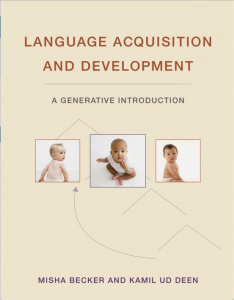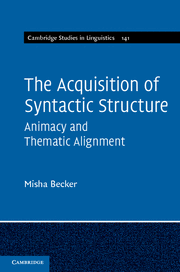 Professor and Chair
Professor and Chair
Spring 2024 office hours: Wednesdays 10:00-12:00 or by appointment
Contact:
Linguistics Department
109 Smith Building, CB#3155
University of North Carolina
Chapel Hill, NC 27599-3155
Tel: (919) 962-1192 (department office)
Email: mbecker (at) email.unc.edu
Link to my CV
Research Interests

I study linguistics because I want to understand the formal system of human language. I am fascinated by this wonderfully intricate and complex system that is integral to both our biological and our social selves: language arises in all members of our species because our DNA provides the blueprint for the cognitive structures to support language, yet it only arises if the right social and interpersonal conditions are present: we have to be part of a community of humans whose language we can perceive. Language is probably unique among biologically driven human developments in that we are driven to acquire it because of our biology, but we can also develop infinite varieties of it and we can do so both early in life and throughout our lives. I think that is cool.
My background is in syntactic theory and the acquisition of syntax, both morphosyntax and argument structure, in children (monolingual first language). I’m also interested in bilingualism, language revitalization, Specific Language Impairment, computational modeling of language learning, and experimental methodologies for studying implicit linguistic knowledge. I’ve recently written a textbook on first language acquisition in children (with Kamil Ud Deen), now available from MIT Press.

From about 2000-2014 my research focused on how children learn “displacing” predicates. These are verbs and adjectives that do not select an external argument (subject) and thus allow another NP to be “displaced” into the subject position. Displacing predicates include raising verbs (e.g. seem or appear), tough adjectives (easy), and unaccusative verbs (arrive). My main question is how children distinguish these predicates from control verbs (want or claim), control adjectives (eager), and unergative verbs (laugh). These are predicates that do select an external argument but occur in superficially similar sentence environments (e.g. John seems/claims to like pizza). The answer I have pursued is that NP animacy provides a crucial cue: encountering a predicate with an inanimate subject should tell learners that the predicate is a displacing predicate. This work culminated in a book about how NP (in)animacy helps children acquire displacing predicates (Cambridge).
More recently my research has turned to collaborations in new directions:
- Dr. Benjamin Frey (UNC American Studies) on Cherokee language revitalization in conjunction with New Kituwah Academy in western North Carolina
- Dr. Kristen Syrett (Rutgers) and Dr. Kristen Lindquist (UNC Psychology and Neuroscience) on children’s acquisition of emotion adjectives
As part of my research on language revitalization, I recently spent 6 months at the Universidad del País Vasco in Vitoria-Gasteiz (Spain) where I studied attitudes of parents and teachers in this city towards Spanish and Basque. While I was there I gave a talk [link 1] [link 2] [link 3] about Cherokee as well as a radio interview.
UNC Language Development Lab
Please click here for information about our on-going studies and how to get involved.
Courses
I regularly teach courses on first language acquisition (for undergrads and grads), and I also sometimes teach a course on bilingualism and one on language revitalization.
| Course Number | Course Name | Frequency | For Whom |
|---|---|---|---|
| LING 203 | Language Acquisition and Development | every year | undergrads |
| LING 305 | Race Against Time: Language Revitalization | occasional summers | undergrads |
| LING 428 | Bilingualism and Second Language Acquisition | occasional (~every 2-3 years) | undergrads and grads |
| LING 528 | Language Acquisition I | every 2 years | grads |
| LING 529 | Language Acquisition II | rarely | grads |
Selected Recent Publications
Books
- 2020. (with Kamil Ud Deen) Language Acquisition and Development: A Generative Introduction. MIT Press.
- 2014. The Acquisition of Syntactic Structure: Animacy and Thematic Alignment. Cambridge University Press.
- 2013. (with John Grinstead and Jason Rothman) Generative Linguistics and Acquisition: Studies in Honor of Nina M. Hyams. John Benjamins.
Papers and Presentations
Please e-mail me to request any papers without links!
Papers
- Pertsova, K. and M. Becker (2020) “In Support of Phonological Bias in Implicit Learning,” Language Learning & Development.
- Becker, M. (2020) “Language Attitudes of Primary School Teachers in Vitoria-Gasteiz. International Multilingual Research Journal, 14(2): 114-129.
- Shablack, H., M. Becker and K. Lindquist (2020) “How do Children Learn Novel Emotion Words? A Study of Emotion Concept Acquisition in Preschoolers.” Journal of Experimental Psychology: General.
- Becker, M. (2017) “Innate Mechanisms for Acquiring Syntactic Displacement.” Biolinguistics vol. 11.
- Becker, M. (2017) “Learning the ‘tough’ Constructions,” Contact Magazine. (link)
- Becker, M. (2017) “Resetting the Polysynthesis Parameter: A Preliminary Proposal,” in N. LaCara, K. Moulton and A.-M. Tessier
(eds.), A Schrift to Fest Kyle Johnson, Linguistics Open Access Publications 1. (link) - Becker, M. (2017) “Reaction Time as a Measure of Implicit Grammaticality Judgment,” in L. Escobar, V. Torrens and T. Parodi (eds.), Language Processing and Disorders, Cambridge Scholars Publishing.
- Gotowski, M. and M. Becker (2016) “An Information-Structural Account of Children’s Wh-In Situ Questions in French,” talk
presented at GALANA 6, University of Maryland, February 2015. (slides), (link) - Becker, M. and S. Kirby (2016) “A-Movement in Language Development” in J. Lidz, J. Pater and W. Snyder
(eds.) Oxford Handbook of Developmental Linguistics, Oxford University Press. - Becker, M. and M. Gotowski (2015) “Explaining Children’s Wh-in situ Questions: Against Economy,” in Proceedings of BUCLD 39, Cascadilla Press. (pdf)
- Becker, M. (2015) “Learning structures with derived arguments” in A. Trotzke and J. Bayer (eds.), Syntactic Complexity across Interfaces Mouton de Gruyter. (pdf)
- Becker, M. (2014) “Animacy and the Acquisition of Tough-Adjectives” Language Acquisition (link) DOI: 10.1080/10489223.2014.928298.
- Becker, M. & B. Estigarribia (2013) “Harder Words: Learning Abstract Verbs with Opaque Syntax” Language Learning and Development,
vol. 9: 211-244. - Becker, M. & J. Schaeffer (2013) “Animacy, Argument Structure and Unaccusatives” in M. Becker, J. Grinstead and J. Rothman
(eds.) Generative Linguistics and Acquisition: Studies in Honor of Nina M. Hyams, John Benjamins. (pdf) - Becker, M., B. Estigarribia and D. Gylfadottir (2012) “Tough-Adjectives are Easy to Learn” in Supplemental Proceedings of BUCLD
36. (link) - Mitchener, W.G. and M. Becker (2011) “A Computational Model of Learning the Raising-Control Distinction” in Research on Language and Computation, vol. 8, pp. 169-207. (pdf)
- Becker, M. and B. Estigarribia (2011) “Drawing Inferences about Novel Raising and Control Verbs” in Proceedings of GALANA 4,
Cascadilla Proceedings Project. (pdf) - Becker, M. (2009) “The Role of NP Animacy and Expletives in Verb Learning,” Language Acquisition, vol. 16, pp. 283-296. (pdf)
- Kirby, S. and M. Becker (2007) “Which it is it? The acquisition of referential and expletive it” Journal of Child Language 34: 571-599.
- Becker, M. (2007) “Animacy, Expletives, and the Learning of the Raising-Control Distinction”, Proceedings of GALANA 2.
- Becker, M. (2006) “There Began to be a Learnability Puzzle”, Linguistic Inquiry, vol. 37:3, pp. 441-456. (pdf)
- Becker, M. (2005) “Learning Verbs Without Arguments: The Case of Raising Verbs”, Journal of Psycholinguistic Research, vol. 34:2, pp. 165-191. (pdf)
- Becker, M. (2004) “Copula Omission is a Grammatical Reflex”, Language Acquisition, vol. 12:2, pp. 157-167. (pdf)
- Becker, M. (2002) “The Development of the Copula in Child English: The Lightness of Be” in Annual Review of Language Acquisition, vol. 2. (pdf)
Recent Talks
- Becker, M. (2018) “Children’s Acquisition of Emotion Adjectives,” Norwegian University of Science and Technology, December 2018. (slides)
- Becker, M. (2018) “Parents’ and Teachers’ Language Attitudes in a Bilingual Community,” The View from the Multilingual Child, Bergische Universität Wuppertal, October 2018. (slides)
- Becker, M. (2018) “Parents’ and Teachers’ Language Attitudes in Vitoria-Gasteiz,” HiTT Linguistics Group talk series, University of the Basque Country, Vitoria-Gasteiz, Spain, June 2018. (slides)
- Becker, M. (with B. Frey) (2018) “Eastern Cherokee/Cheroqui Oriental/Tsalagi,” Hitz Adina Mintzo talk series, Oihaneder Euskararen Etxeko, Vitoria-Gasteiz, Spain, April 2018.
- Becker, M. (2018) “Palooza Feels Binty about Something! Studying Children’s Acquisition of Emotion Adjectives,” University of Bordeaux–Montaigne, Campus sur la Nive (IKER), Bayonne, France, March 2018. (slides)
- Becker, M. and B. Frey (2017) “A Multi-pronged Approach to Revitalizing Eastern Cherokee,” talk presented at the First International Conference on Revitalization of Indigenous and Minoritized Languages, University of Barcelona and University of Vic, April 2017.
- Becker, M. (2016) “Sentence-level and Environmental Cues to Lexical Representation of Abstract Predicates,” invited talk at the SynLinks Workshop at UConn (Links between Representation and Processing in Syntactic Acquistion), September 2016. (slides) (link to workshop website)
- Becker, M. (2016) “Subject Selection in Raising and Control: Psycholinguistic Evidence,” invited talk at the Conference on Nonfinite Subjects, University of Nantes, April 2016. (slides)